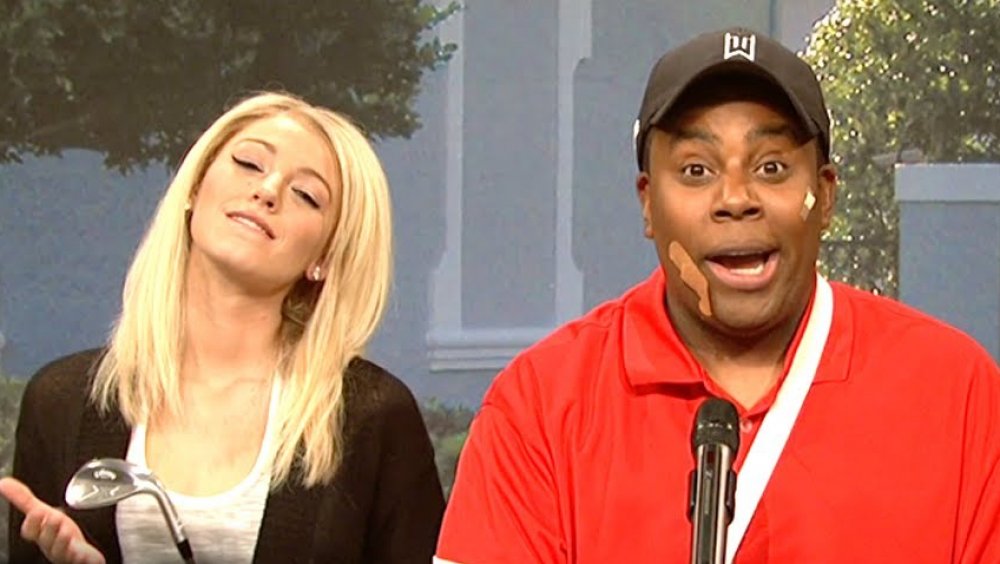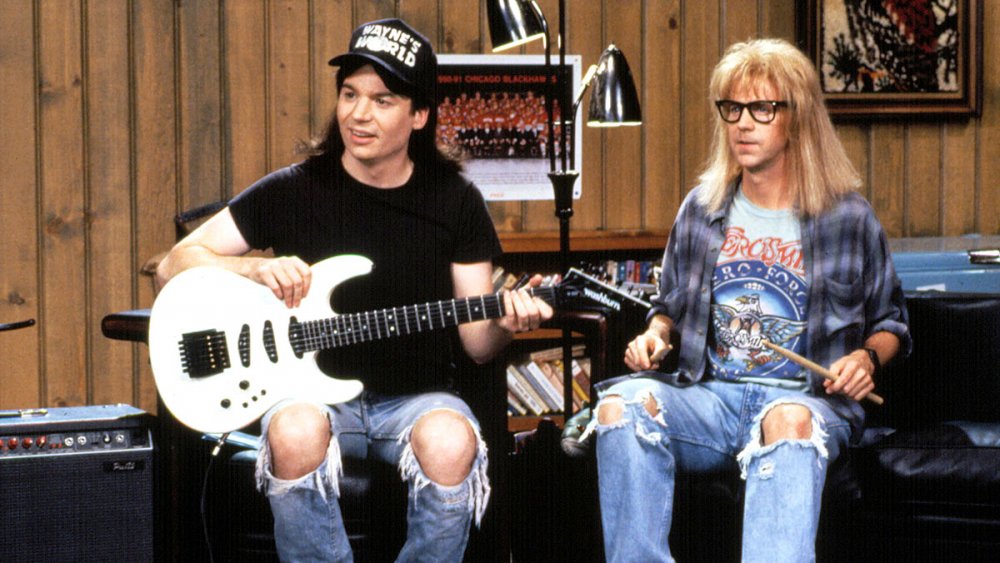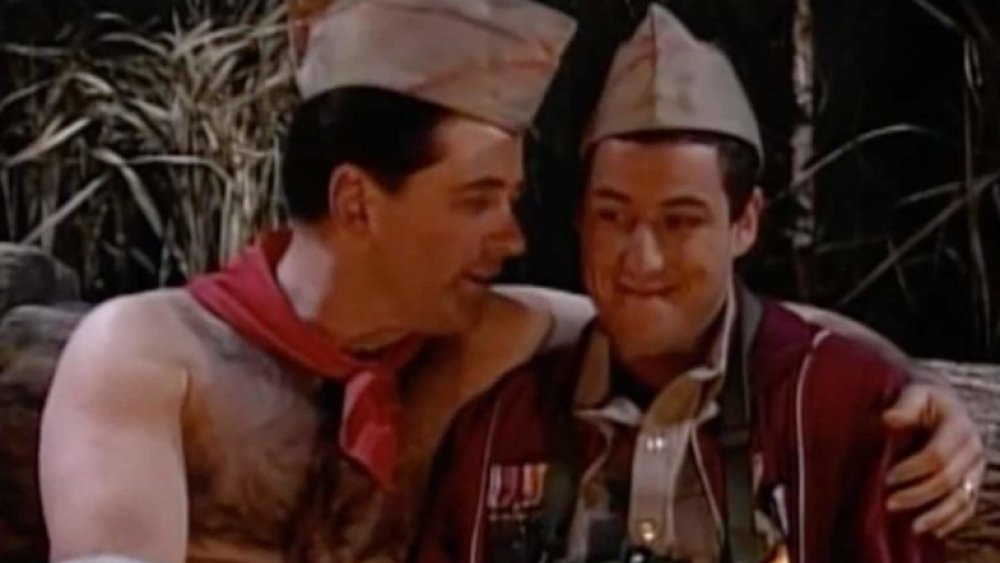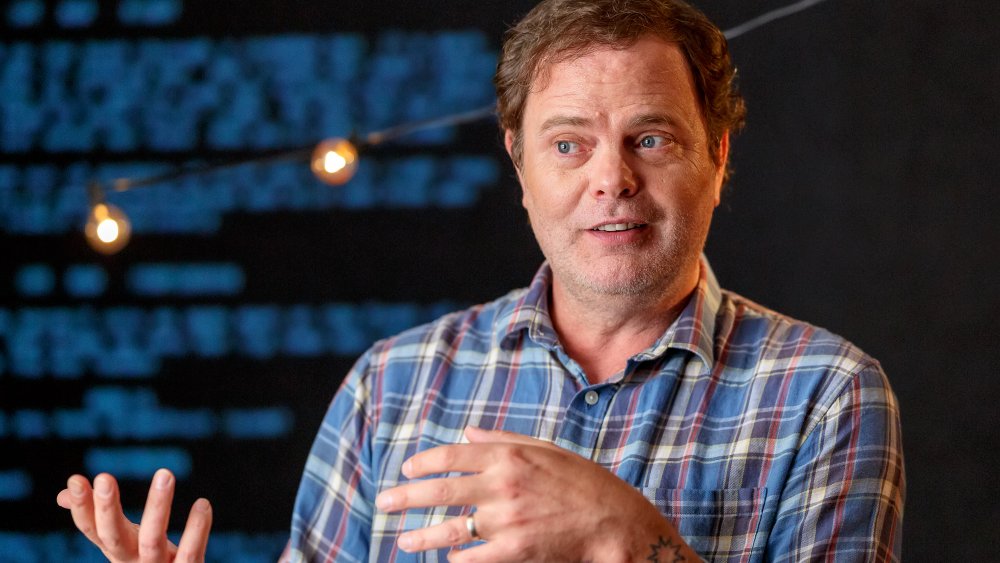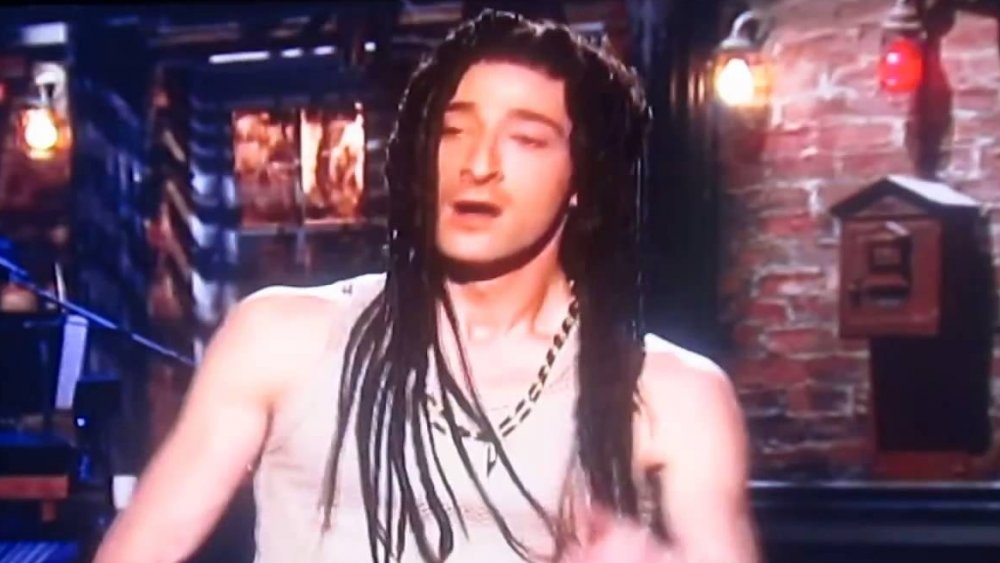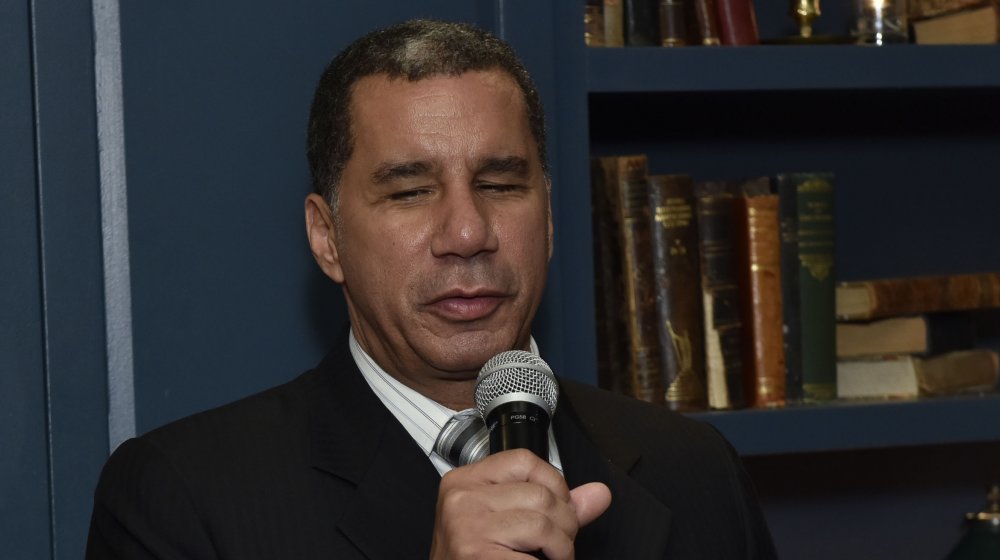SNL Sketches That Went Too Far
Saturday Night Live is a cultural touchstone. It's hard to imagine a world in which "more cowbell" has no meaning, where "Cheeseburger, cheeseburger!" fails to get a laugh, or where no one's ever heard of Debbie Downer. Its weekly live format allows the program a flexibility that keeps it relevant, while its ever-shifting talent pool inspires comic chemistry from performers who often go on to become icons of the stage and screen.
But sometimes, SNL slips off the razor's edge of comedy into a great big dumpster of foolhardiness. For as often as the show has created legendary comedy, so too has it stumbled onto its face with an ill-timed joke, a badly conceived bit of ribbing, or even outright ignorance. Some of these failures have become nearly as infamous as SNL's greatest successes — yet they tend to be quite a bit harder to track down, as no creator wants to keep their mistakes circulating. Join us as we explore the sketches that crossed over from irreverence into insult, and all the condemnation, uproar, and outright censorship that ensued.
Wayne's World mocks Chelsea Clinton
Comedy isn't known for sparing those in the public eye. In fact, skewering the people most visible (and often most powerful) is, many comedians would argue, the duty of the art form. To laugh at someone is to render them human, as opposed to unreachably distant — and, thus, unreachably powerful. Many of SNL's greatest sketches were born from this attitude, from Tina Fey's wry take on Sarah Palin to Melissa McCarthy's wild-eyed Sean Spicer. Those who matter most are, on SNL, often those whose parodies evoke the biggest laughs.
But a line was crossed in 1992 when the spotlight slipped from President Clinton to his daughter, then-13-year-old Chelsea Clinton. During a Wayne's World sketch celebrating Clinton's electoral victory, Chelsea is named as one of the ten most exciting things about the upcoming Clinton presidency because her "unkind" adolescence has the potential to create a "babe in waiting." Condemnation was swift, especially from First Lady Hillary Clinton, and Mike Myers ended up apologizing publicly in addition to sending a contrite letter to the White House. Some, after all, might be in the public eye through no actions of their own.
An inappropriate scoutmaster
Adam Sandler's Canteen Boy is the sort of character that makes SNL famous. A naive, overgrown Boy Scout with an ever-present canteen slung around his neck, he commands no respect — yet never loses his verve for the great outdoors. Plus, randomly, he can summon snakes with a well-sung bird call. He's just enough like someone you know to be hilarious, yet odd enough to remain entirely his own creation: a singular character pulled off by an actor who would go on to become a pillar of 2000s comedy.
But a 1994 Valentine's Day sketch featuring the character went over like a canteen full of cement. In it, an increasingly uncomfortable Canteen Boy is subjected to sexual overtures from his lascivious scoutmaster (played to the hilt by Alec Baldwin), growing from offers of wine to invitations to share a sleeping bag. Canteen Boy escapes (and has his reptilian revenge) but the damage was done. The Boy Scouts of America registered their dismay, columnist Richard Roeper reported getting a tidal wave of calls from upset readers, and a disclaimer was added to all future airings of the episode, stressing that Canteen Boy was 27 years old. Canteen Boy might get laughs for being an oblivious weirdo, but becoming a genuine victim was just too far.
Memories of Danny's Song
2007's "Danny's Song" sketch, featuring The Office star Rainn Wilson, took the Kenny Loggins classic in a dramatically different direction than audiences could have expected. As the strains of the romantic ballad float through a pub, men take turns remembering moments of their life connected to it. The recollections grow more and more absurd: a petting zoo mishap gives way to a fond memory of committing arson, which is topped by an obscene moment in an airport bathroom. All of it culminates in the misty-eyed friends sighing, pulling out their guns, and committing the stick-up they came to the bar to perpetrate in the first place.
But one character's memory proved to be a little too much for viewers. Bill Hader's character remembers spending a beautiful day in a park with his dad, where they threw pennies into a fountain and chased squirrels. "The first day I ever thought to myself," Hader concludes, "just 'I have a dad,' and not, 'I have a dad with Down Syndrome.'" Jon Colman, CEO of the National Down Syndrome Society, issued a swift criticism of SNL's mockery of the condition, and later broadcasts of the episode have bleeped the words "Down Syndrome" out of the dialogue.
A creepy repairman crosses the line
Sometimes, a sketch manages to land at the worst possible moment. This was the case when a 2017 episode featured a sketch entitled "Safelite AutoGlass," in which a creepy repair guy repeatedly damages a car in order to fix it... and gain access to the teenage girl he's grown fixated on. Naturally, the real Safelite AutoGlass was miffed, tweeting that they were perfectly capable of taking a joke but did not appreciate having their employees insulted.
But what ended up getting the sketch entirely pulled from further broadcasts was the context in which the joke landed: the apex of the #MeToo moment. It seems likely that SNL realized the sketch wasn't going to land as a light-hearted bit of ribbing, and instead as a sleazy echo of a systemic problem making hourly headlines. The sketch was replaced with a previously unaired one entitled "The Last Fry," and the world's worst windshield repairman was left to molder in the void of SNL's mistakes.
Adrien Brody ad-libs his way into destruction
SNL takes its licks in terms of public opinion — it's the nature of what they do. Comedy is inherently provocative, and trying for genius means risking disaster. But sometimes, it's not actually the planned sketches that arouse anger. Sometimes, it's what a guest host does off-the-cuff, beyond the boundaries of writers, actors, and showrunners, that causes trouble for everyone involved.
This was the case in a 2003 episode starring Adrien Brody, featuring musical guest Sean Paul. The former introduced the latter, a Jamaican musician, by indulging in 45 seconds of faux-patois while wearing a set of fake dreadlocks. It wasn't just cringe-worthy — it was nearly impossible to sit through. Brody has been banned from the show, and though the questionable nature of this moment is certain to have played a part, it is likely that it also has something to do with SNL producer Lorne Michaels' infamous hatred of ad-libbing. Thus, a celebrated actor was banished — and a truly awful attempt at impersonation was left to fade into memory.
A nude beach sketch makes waves
1988 was a different time. Hair was bigger. Technology was clunkier. Comedy was similar in spirit, but different in execution. The American public was a bit more squeamish then, and standards of decency were stricter. Enter 1988's "Nude Beach" sketch, which entered the zeitgeist like a grenade through a window.
In the sketch, a nervous newcomer is welcomed to a nude beach by his enthusiast friend. It's no big deal, he is assured — it's just a beach where everyone happens to be naked! But that becomes pretty clearly not the case when every man to whom he is introduced comments on his genitalia. The denizens of the nude beach, in fact, cannot stop commenting, with an air of utterly casual camaraderie, on every man's most intimate part. The public was shocked — 1988 wasn't exactly filling the airwaves with such frank discussion of body parts — but the sketch remained, and can be streamed today in its full glory, as nakedly uncensored as the characters it features.
Martin Lawrence gets raunchy
Comedian Martin Lawrence is one of a small number of people banned from SNL for life. The reason? A rather racy 1994 monologue referencing the then-current scandal around John and Lorena Bobbitt. In his monologue, Lawrence describes the terror he now feels regarding the opposite sex, and riffs off the experience John Bobbitt must have had after the high-profile act of mutilation had been completed. That wasn't the end of his scandalous soliloquy, however — he goes on to discuss feminine hygiene practices. Or, more precisely, a lack thereof among the women he was seeing.
Lawrence wasn't just banned from ever appearing on SNL ever again, but was, in fact, censored from the episode he had hosted. An intertitle replaced his monologue in repeat airings, describing "a frank and lively discussion" that "nearly cost us all our jobs." SNL is known from crossing lines, but some will get a laugh while others will get you banished.
Missing the point of #metoo
Comedy is more art than science, and nothing proves this more thoroughly than SNL and its plethora of sketches that aren't exactly flops, but couldn't be called successes either. Take 2017's "Sexual Harassment Charlie" sketch. In it, the women of a workplace are presented with two men being fired for sexual harassment. One, a power-player prone to making inappropriate comments, apologizes for his misconduct but is met with derision. The other, a front desk attendant named Charlie played by a cheeky Kenan Thompson, is still gleefully obscene — but the women laugh his creepy comments off as lovably eccentric. Ultimately, it is revealed that Charlie is wanted for kidnapping and living under an assumed name.
For many, the joke didn't so much fail as implode. Commentators called it awkward, attempting to parody a double standard that doesn't actually exist, and outright blind to the actual ramifications of harassment. Sometimes you strike gold, as with SNL's similarly-themed "Welcome to Hell" sketch, and sometimes... well, sometimes you get Charlie.
A blind joke about blindness
We might not all wield political office, but we can all wield a joke and its potentially devastating power. That's why comedy is so important: when it lampoons the powerful, it empowers the teller and the audience alike. But when mishandled, that power tends to blow up in a comedian's face. Witness the 2008 Weekend Update segment in which Fred Armisen portrays Governor David Paterson.
Paterson is legally blind, and Armisen plays his disability to the absolute hilt, squinting his eyes and holding charts upside down. That in and of itself is a put off-putting, but combined with the way Armisen portrays Paterson as a buffoon, in seeming connection to his blindness, was too much to bear. Paterson's office criticized the sketch publicly, taking care to note that Paterson himself makes light of his vision problems but never aligns them with stupidity or an inability to perform complex jobs. It's rare that the subject of mockery manages to pull off better jokes about themselves than the professional comedians, but when it came to Paterson, this definitely was the case.
SNL's take on Tarantino... and Jesus
The year was 2013 and the world was watching Django Unchained, Quentin Tarantino's ode to bloody revenge. SNL, having its finger on the pulse, leapt on the chance to riff off the famed director's take on the antebellum south — by moving it to the era of the Bible. Thus was "Djesus Uncrossed" born, a sketch in which Jesus Christ blows apart Judas Iscariot with a machine gun, Saint Peter demands Roman scalps from the Apostles, and the Prince of Peace himself urges his unlucky foes to say hi to his father. It's as lurid as Tarantino's oeuvre demands, all while targeting figures of devotion for, oh, millions of people worldwide.
Outrage was swift. The Council on American-Islamic Relations decried the sketches' alignment of Jesus, perhaps the world's most famous emissary of peace, with destruction and gore. Sears pulled the ads running alongside the sketch. Uniquely, no one was angry because the sketch mocks Jesus, exactly, but because it portrays him as cool according to standards he, and the faiths he inspired, explicitly reject. Bottom line? Don't expect a sequel sketch entitled Once Upon a Time in Galilee anytime soon.
Mocking abuse through Tiger Woods
Modern sports legend Tiger Woods took a tumble from grace when a 2009 car accident revealed his multiple infidelities. Naturally, SNL attempted to comment on the scandal — and stumbled just as badly as Woods himself. In a sketch framed as a fictitious installment of Wolf Blitzer's "Situation Room" program, Kenan Thompson's Woods apologizes for his indiscretions, disappears off camera repeatedly, and returns more and more injured every time. Finally, he holds up a prepared statement — only to reveal the words "HELP ME" and "SHE IS SO STRONG" on the back of the papers.
Commentators wondered if the sketch went too far in making light of domestic abuse, particularly in seeming to think that reversing the "battered wife and violent husband" dynamic was all it took to make such humor acceptable. The sketch remains up, so fans may judge for themselves — and, if nothing else, marvel at Blake Lively's awkward attempt at a Swedish accent.
